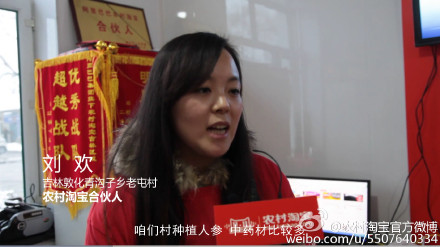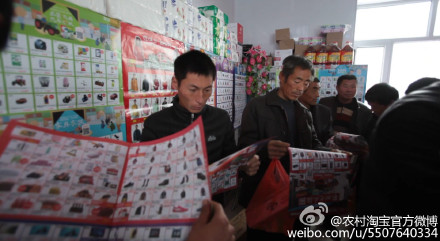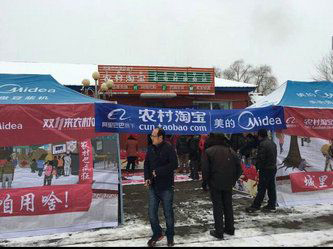Online sales boom in rural parts of NE China
By Wang Zhen
2015-11-19
Liu Huan hasn't even had a minute's break from the hustle and bustle at her service center, as she runs around placing orders, answering questions, and receiving parcels, but that's just a normal day for her here - even though 'here' is a remote village, Laotun, at the foot of Changbai Mountain in Jilin province.
"Why not come back on Nov 11, when things are much cheaper," Liu tells one of her customers patiently, then adds, "But we may still have some discounts, just let me have a look,"and quickly places a few orders.
 |
|
Lu Huan, online business operator, in Laotun village, Jilin province. [Photo provided to ejilin.gov.cn] |
The nearest city to Liu's operation is Dunhua, two hours by car, but that hasn't dampened the enthusiasm for shopping here, in fact it's growing online. Her center was set up by China's e-commerce giant, the Alibaba Group, to connect with more rural customers. She got the job when she decided to return to her hometown after graduating from a polytechnic school in Jilin, and was lucky enough to get the only Alibaba outlet in the area after undergoing the company assessment.
So, now, buying things, placing orders and receiving parcels for customers are her daily routine, and she gets an 8-percent commission on each sale and, her good service has won her the trust of customers.
For example, some ginseng growers who needed some steel tubing for their greenhouses, so Liu makes contacted some steel tube suppliers online, examined the quality, got the most suitable size, and helped the villagers save up to 120,000 yuan ($1,879).
Her center also provides convenience, with its delivery service once a day, which is a real relief since the 70-kilometer ride over a bumpy dirt road to the nearest city drives people crazy.
The services, prices and logistic support have gotten a lot of villagers to turn to her cun.taobao.com.in searching for their goods, instead of the local markets or cooperatives that they used to go.
"It's really handy using it [the center]. All I have to do is just tell Liu to look up whatever I want and to give me a good price," said one shop visitor, when asked about the service, "Otherwise, [we would]have to take the bus to Dunhua for 20 yuan and if it's a rainy day, we'd have to stay overnight."
On China's recent Double 11 Day, a shopping feast, the villagers placed around 600 orders, worth 1 million yuan, and elsewhere in China, more than 8,000 villages went on a shopping spree, according to information from Liu's account with Sina Weibo, a Chinese version of Twitter.
 |
|
Villagers looking for goods they need at the outlet. [Photo provided to ejilin.gov.cn] |
Of course, all of this is part of Alibaba's rural marketing strategy, as the Group eyes rural people as potential customers and, in the words of its president, Jin Jianhang, who, according to China Radio International, spoke at the 2015 Boao Forum for Asia, and said, "The number of online shoppers in China's rural areas will hit 300 million. That's on the same scale as urban areas."
So, the Group's rural retail network is expanding, according to Xinhua News Agency, after it announced in October 2014 that it would put 10-billion over the next 3-5 years, into 1,000 "operation centers" in county seats, and up to 100,000 "service outlets" in villages to expand its presence.
The majority of people here in Datun earn their living from ginseng or tobacco, with each household bringing in as much as 1 million yuan a year. So, Lin Yianyi, a 41-year-old ginseng farmer, was able to fork out a few thousand yuan for a TV set and ginseng equipment, on Nov 11, and got his goods at his home.
 |
|
Online business promotes itself in a village in Jilin province. [Photo/ news.xwh.cn] |
Lin says he didn't trust online retailers in the past, because there were "frauds everywhere, and products that either didn't work or were of poor quality". Now, however, he's singing a different tune, thanks to the online service center, and goes on to explain, "I bought 3,000 pieces of steel tubing for my ginseng, at just 3 yuan each, which was cheaper than that in the shops."
It seems that half the villagers in Laotun are addicted to online shopping.




